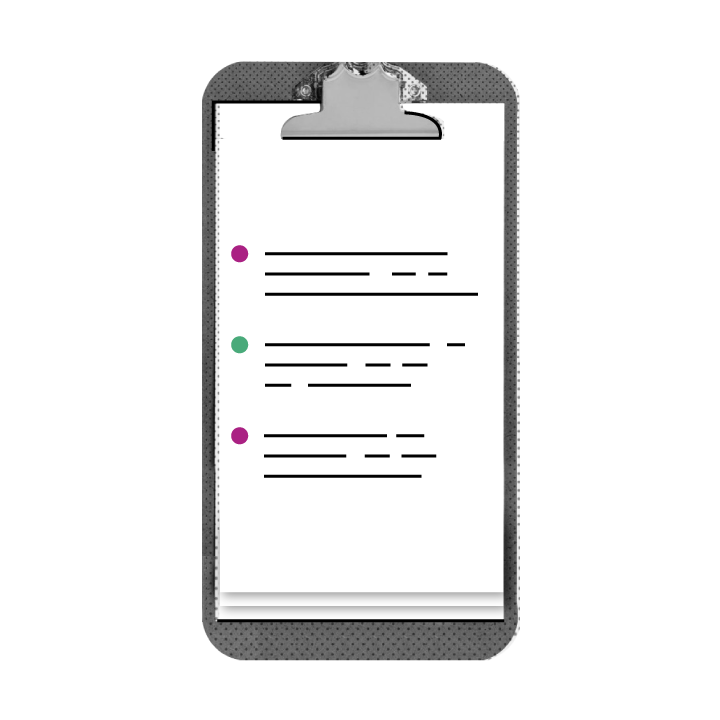Questionnaires and ROM
Questionnaires are important in mental health care. After all, you can't simply scan someone to determine how they are feeling, or measure blood pressure and temperature to see if symptoms are improving. Instead, the data available in mental health care almost always come from questionnaires.
These can be diagnostic, help identify problems and determine their nature and severity. And they can help determine whether treatments are successful, as in Routine Outcome Monitoring (ROM). So, questionnaires are important.
But we think they can and should become an even more integral part of the treatment plan.
That's why Minddistrict continues to develop questionnaires and the functionalities around them. So you can keep using them effectively for diagnostics and ROM, but also to enable you to use them for so much more.
Would you like to get in touch now? Contact us
What is Minddistrict doing now?
 Yes, you were always able to use Minddistrict for questionnaires and ask patients to fill out the PCL-5, or the GAD-7. But our product team is developing them in such a way that they're easier to use and offer better support. The questionnaire functionality receives an upgrade, so to speak.
Yes, you were always able to use Minddistrict for questionnaires and ask patients to fill out the PCL-5, or the GAD-7. But our product team is developing them in such a way that they're easier to use and offer better support. The questionnaire functionality receives an upgrade, so to speak.
All questionnaires go mobile
Some were available in the mobile app already, but soon it will be possible for patients to fill out all questionnaires on their mobile phone. This will lower the threshold to complete them. And people will receive notifications on their phone to keep them engaged.
All outcomes are transparent
At least, for the people concerned: the healthcare professional and patient. Outcomes are not kept secret from patients. Both patients and professionals can see the information and/or the corresponding graph. But nobody else can.
Help with interpretation
So there is an outcome, now what? Seeing figures, tables and outcomes is great, but what do they actually say? What can you do with the information? We offer questionnaires that help patients and care providers interpret the outcomes.
More validated questionnaires
We are expanding our catalogue: many more questionnaires in several languages will be added. Want to know which ones? Follow us on LinkedIn, and we will keep you informed!
Vision: what are we working towards?
Our goal is a world in which people receive care that is precisely tailored to them: a unique and validated route to recovery. One way to work towards that goal is through short measurement moments. Asking short questions more often, for example by using the Experience Sampling Method (ESM), results in more available data. That data and its analysis are at the heart of the personalised journey.
Imagine that, based on what the patient filled in, the professional receives suggestions for the next step in treatment. That you, as the care provider, have instant information on how each piece of content fits the treatment setting. That you can compare each step with the previous one. Wouldn't that contribute to informed choices and support you as care professional? Wouldn't that lead to bespoke care pathways, and maybe even lead to more efficiency?
We have written a white paper on this topic, to further explain our goal and how we want to get there. We're happy to send it to you if you're interested!
.png)
Routine Outcome Monitoring (ROM)
We don't know about you, but we know a lot of people for whom ROM has quite a bitter aftertaste. At least in the Netherlands, where ROM might be seen as a benchmarking tool only.
But ROM can actually be very useful for healthcare professionals and patients. Because it's helpful to know where you stand and where you came from. To see in a graph what progress has been made. We believe in the power this data brings to the care process and that's why we make questionnaires as accessible and insightful as possible. Because care is not about data, it's about people.
Ronald, a psychiatric nurse, explains: “When one of my patients starts with an antidepressant, I often give them a ROM to fill in weekly, to measure the effect of the treatment. You can't see anything on the outside, but by filling in the depression questionnaire every week, you can see an upward trend if the treatment is having effect. That's a way to show the treatment is working.”
Get in touch
Do you have any questions or comments? Or would you like to start using the questionnaire functionality yourself?
Contact us
